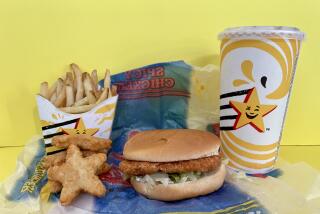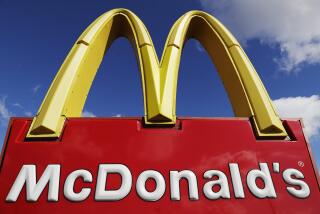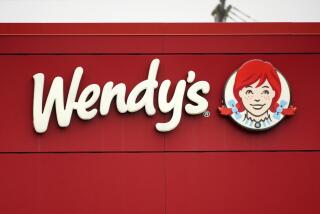Pocahontas Is Blazing a Trail for Burger King : Restaurants: The No. 2 hamburger chain says its promotion based on the Disney film is its most successful ever.
- Share via
For Burger King, Pocahontas is the princess who roared. And she’s giving the nation’s No. 2 hamburger chain an edge in this summer’s escalating Burger Wars.
Burger King says its promotion, based on the hit Walt Disney Co. film, is its most successful ever, surpassing last summer’s “Lion King” movie tie-in. According to the company, parents are buying their children special “Pocahontas” Kids Club meals at the rate of 8 million a week.
If such success continues, Burger King is poised to gain market share from No. 1 McDonald’s, whose promotion related to the “Mighty Morphin Power Rangers” movie has done well, but not as well as “Pocahontas.” Analysts estimate that Burger King sales at eateries open at least a year are up 5% domestically since spring, while McDonald’s are up about 2.5%.
The tie-in war comes as lower beef prices have prompted leading fast-food chains to slash prices on their flagship burgers and on their combination meals, forcing weaker chains into an unwanted price war. Revell Horsey, a restaurant industry analyst with Alex. Brown & Sons in Baltimore, says drive-through chains such as Rally’s, Checkers and In-and-Out Burger--which prospered only a few years ago--are losing share because of price competition. To keep up, In-and-Out has tinkered with its traditional menu, adding discounted combo meals consisting of a burger, fries and a drink.
The discounting is having an impact on the large chains too. For example, Horsey said McDonald’s domestic operating margin, a measure of profitability, declined during the quarter that ended in June, to 18.7% from 19.6% in the same period of 1994.
“The promotional activity is fierce,” Horsey said.
Driving the discounting is the fact that fast-food sales have slowed, pushing the chains to do what they can to steal market share from each other, says David Adelman, a restaurant industry analyst with Dean Witter & Co.
In this environment, the summer movie tie-ins, particularly those aimed at children, have become an increasingly important competitive tool, Adelman said. A third of Burger King’s customers are families, many of whom visit the chain at the urging of youngsters eager for the toy that comes with children’s meals.
Burger King says a family buying a $2 kid’s meal typically spends between $8 and $10 at the restaurant because the parents also eat. “The residual value is tremendous,” Burger King spokeswoman Kim Miller said.
Certainly Burger King is getting a lift from the success of “Pocahontas” itself. Though not as big for Disney as “Lion King,” the movie has grossed more than $100 million at the box office. Other companies outside the fast-food business with ties to “Pocahontas” are also expected to do well.
Margaret Whitfield, a toy industry analyst with Tucker, Anthony & Co. in New York, predicts El Segundo-based Mattel will take in about $100 million from sales of “Pocahontas” toys, about the same it received from “Lion King” toys. But Mattel’s “Pocahontas” line is potentially more profitable because the dolls are made from existing Barbie molds, Whitfield said. “Lion King” toys were designed from scratch.
Some summer movie tie-ins have been a disappointment in toys and in the fast-food arena. Though “Batman Forever” did well, the toy line from Hasbro has encountered production problems, leading to a shortage of bad-guy action figures, Whitfield said. She predicted Hasbro will sell less than $100 million of its Batman action figure line, compared to the $125 million to $150 million it might have if production had gone smoothly.
Restaurant industry analysts say Taco Bell’s tie-in to the film “Congo” was no match for “Pocahontas” or McDonald’s “Mighty Morphin Power Rangers.” While declining to quantify its results, McDonald’s said it is pleased with the Power Rangers promotion. Though the tie-in ends next Monday, a spot check around Los Angeles showed some restaurants had run out of the toys.
(BEGIN TEXT OF INFOBOX / INFOGRAPHIC)
The Burger Market
Here’s how the $33 billion quick-serve hamburger market looked at the end of 1994: McDonalds: 45% Burger King: 18.5% Wendy: 12% Hardees: 10% Jack in the Box: 3% Carl’s Jr.: 1.7% Other: 9.8%
Source: Alex. Brown & Sons
More to Read
Eat your way across L.A.
Get our weekly Tasting Notes newsletter for reviews, news and more.
You may occasionally receive promotional content from the Los Angeles Times.










